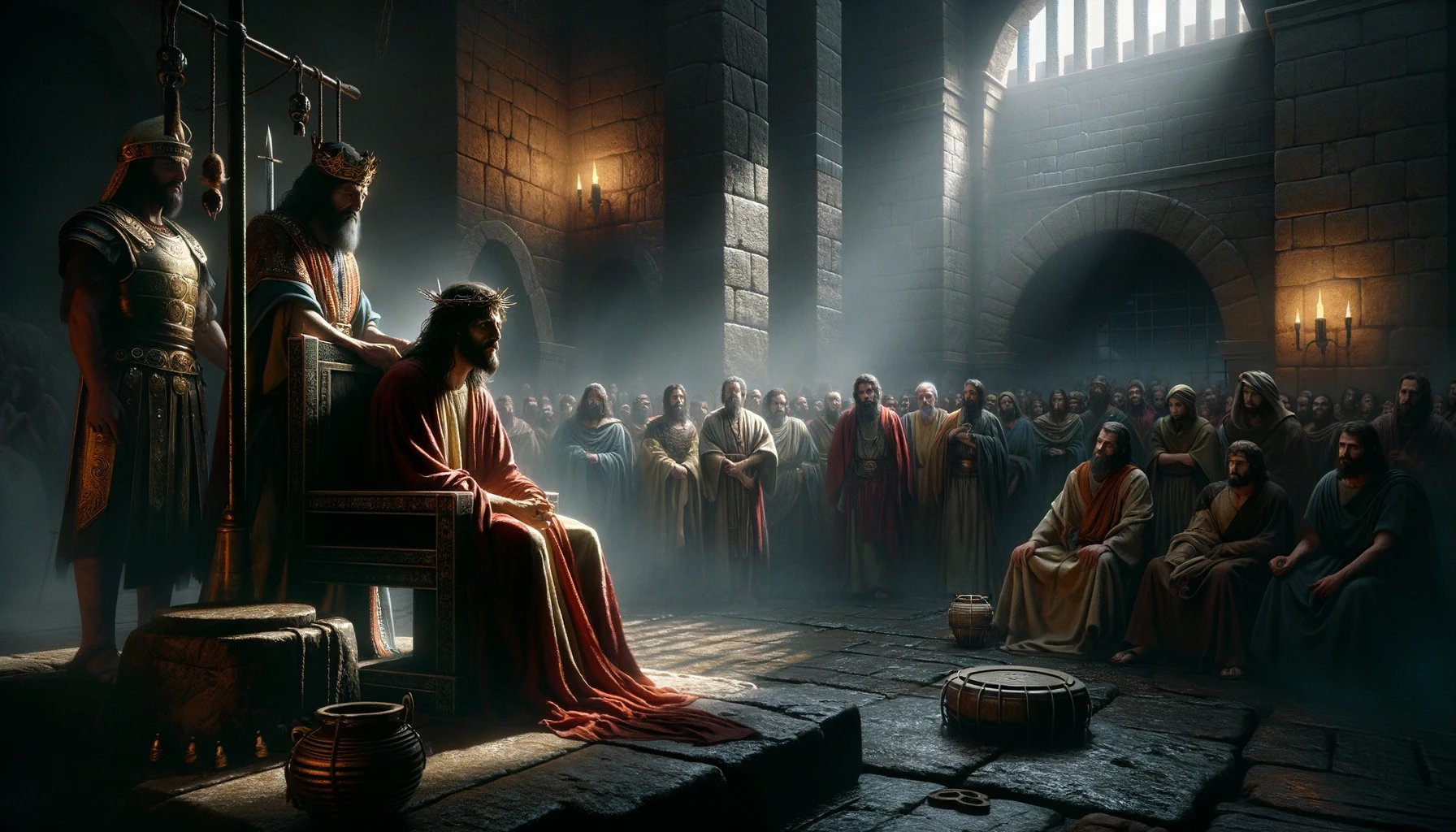Home>Christian Videos>Bible Stories>Why Did Herodias Want John The Baptist Killed


Bible Stories
Why Did Herodias Want John The Baptist Killed
Published: March 6, 2024
Jason DeRose, Managing Editor at Christian.net, uses his expertise in religion and journalism to deepen understanding of faith's societal impacts. His editorial leadership, coupled with a strong academic background, enriches the platform’s diverse content, earning him recognition in both journalism and religious circles.
Discover the story of Herodias and John the Baptist in the Bible. Learn why Herodias sought to have John the Baptist killed in this intriguing biblical tale. Explore the significance of this event in biblical history.
(Many of the links in this article redirect to a specific reviewed product. Your purchase of these products through affiliate links helps to generate commission for Christian.net, at no extra cost. Learn more)
Table of Contents
The Background of Herodias
Herodias was a complex and influential figure in the New Testament, known for her role in the execution of John the Baptist. She was the daughter of Aristobulus, making her a member of the Herodian dynasty. Herodias was first married to her uncle, Herod II, but later left him to marry Herod Antipas, who was the tetrarch of Galilee and Perea. This marriage caused a scandal, as Herod Antipas had divorced his first wife to be with Herodias. The union was not only controversial but also politically significant, as it solidified Herodias' position within the ruling family. Herodias was a woman of ambition and influence, and her actions were often driven by a desire for power and status. Her background and familial connections played a crucial role in shaping her motivations and decisions, particularly in her conflict with John the Baptist.
The Conflict Between Herodias and John the Baptist
-
Disapproval of Her Marriage: John the Baptist publicly criticized Herodias' marriage to Herod Antipas, citing that it was unlawful according to Jewish law. This condemnation was a direct challenge to Herodias' position and authority, as it undermined the legitimacy of her marriage and questioned her moral character.
-
Threat to Her Influence: John the Baptist's influence and popularity posed a threat to Herodias' hold on power. His teachings and following garnered significant attention, which could potentially undermine Herodias' standing within the ruling family and the broader community. This posed a direct challenge to her desire for control and influence.
-
Clash of Beliefs: Herodias and John the Baptist had conflicting religious and moral beliefs. Herodias' actions and lifestyle were at odds with John the Baptist's teachings, creating a fundamental clash between their ideologies. This clash further fueled the animosity between them and contributed to the intensification of their conflict.
-
Personal Vendetta: Herodias may have harbored personal resentment towards John the Baptist for publicly shaming her and challenging her authority. His outspoken disapproval of her marriage and lifestyle likely fueled her desire for retribution, leading to a deep-seated personal conflict between them.
-
Influence on Herod: Herodias recognized the influence John the Baptist had over Herod Antipas. She may have perceived him as a threat to her own influence over Herod and sought to eliminate this challenge to her power. Herodias' desire to maintain control over Herod's decisions and actions likely played a significant role in her conflict with John the Baptist.
The conflict between Herodias and John the Baptist was multifaceted, driven by a combination of personal, religious, and political factors. Their clash of beliefs, John the Baptist's influence, and Herodias' desire for power all contributed to the escalating tension between them, ultimately leading to the tragic outcome for John the Baptist.
Herodias' Motives for Wanting John the Baptist Killed
-
Personal Vendetta: Herodias harbored a deep-seated personal vendetta against John the Baptist due to his public criticism of her marriage to Herod Antipas. His outspoken disapproval and condemnation of her union were not only a direct challenge to her authority but also a source of personal humiliation and resentment. Herodias' desire for revenge and retribution likely fueled her determination to see John the Baptist eliminated, as she sought to avenge the shame and disgrace she had endured.
-
Preservation of Status and Reputation: Herodias was deeply invested in maintaining her status and reputation within the ruling family and the broader community. John the Baptist's vocal opposition to her marriage posed a significant threat to her social standing and legitimacy. By seeking to have him killed, Herodias aimed to protect her honor and preserve her position of influence, ensuring that her reputation remained untarnished in the eyes of society.
-
Consolidation of Power: Herodias was driven by a relentless pursuit of power and control, and John the Baptist's presence posed a direct challenge to her authority. His influence and following presented a potential obstacle to Herodias' quest for dominance within the political and social spheres. By eliminating John the Baptist, Herodias sought to consolidate her power and solidify her position, ensuring that no dissenting voice could undermine her hold on authority.
-
Religious and Ideological Conflict: Herodias' motives were also shaped by the profound religious and ideological conflict between herself and John the Baptist. His teachings and moral stance directly contradicted her actions and lifestyle, creating a fundamental clash of beliefs. Herodias may have viewed John the Baptist as a threat to her way of life and sought to eradicate this challenge to her values and practices, thereby reinforcing her own convictions and authority.
-
Influence Over Herod: Herodias recognized the impact that John the Baptist's words and actions had on Herod Antipas. She may have perceived him as a threat to her own influence over Herod and sought to eliminate this potential rival. By removing John the Baptist from the equation, Herodias aimed to maintain control over Herod's decisions and ensure that her sway over him remained unchallenged.
Herodias' motives for wanting John the Baptist killed were deeply rooted in personal, social, and political factors, driven by a complex interplay of vengeance, power dynamics, religious conflict, and the preservation of her own status and influence. These motives culminated in her relentless pursuit of John the Baptist's demise, ultimately leading to the tragic outcome of his life.
The Role of Herod in the Situation
-
Personal Dilemma: Herod found himself in a personal dilemma concerning John the Baptist. On one hand, he held a certain level of respect for John, recognizing him as a righteous and holy man. Herod was intrigued by John's teachings and was aware of his widespread popularity among the people. However, on the other hand, Herod was entangled in a complex web of personal relationships and political considerations, particularly his marriage to Herodias. This internal conflict placed Herod in a precarious position, torn between his admiration for John and the pressures exerted by his marital situation.
-
Influence of Herodias: Herodias wielded a significant influence over Herod, manipulating his decisions and actions to align with her own interests. Herodias' relentless pursuit of retribution against John the Baptist placed Herod in a difficult position, as he was compelled to navigate the intricate dynamics of his relationship with Herodias while also grappling with his own regard for John. Herod's susceptibility to Herodias' influence played a pivotal role in shaping the outcome of the situation, as he ultimately succumbed to her demands and authorized the execution of John the Baptist.
-
Fear of Public Opinion: Herod was also mindful of the public opinion and the potential repercussions of his actions regarding John the Baptist. The widespread reverence for John among the people posed a dilemma for Herod, as he was wary of the public backlash that could arise from harming a figure held in such high esteem. Herod's concern for maintaining his own standing and reputation in the eyes of the populace further complicated his role in the situation, as he grappled with the implications of his decisions on the broader public perception of his leadership.
-
Reluctant Compliance: Despite his personal reservations and the internal conflict he faced, Herod ultimately yielded to the demands of Herodias and her daughter. His reluctance to refuse their request for John the Baptist's execution underscored the extent of Herodias' influence over him and the intricate power dynamics at play within the ruling family. Herod's compliance with the unjust and tragic fate of John the Baptist highlighted the complexities of his role in the situation, shedding light on the interplay of personal convictions, external pressures, and the dynamics of power and influence.
Herod's role in the situation involving John the Baptist was characterized by a tumultuous interplay of personal convictions, external pressures, and the dynamics of power and influence. His internal conflict, susceptibility to Herodias' influence, and apprehension regarding public opinion all contributed to the complexity of his involvement in the events leading to the tragic fate of John the Baptist.
The Consequences of Herodias' Actions
-
Escalation of Conflict: Herodias' decision to pursue the execution of John the Baptist resulted in the escalation of the conflict between herself and those who revered John. This act of retribution heightened the tensions within the community and deepened the divide between Herodias and those who held John in high esteem.
-
Impact on Herod's Reign: The repercussions of Herodias' actions extended to the stability of Herod's reign. The unjust execution of a revered figure like John the Baptist sparked discontent among the people, posing a threat to the legitimacy of Herod's leadership. Herodias' relentless pursuit of her own interests had a destabilizing effect on the political landscape, undermining the authority of the ruling family.
-
Moral and Ethical Ramifications: Herodias' orchestration of John the Baptist's death raised profound moral and ethical concerns within the community. Her calculated pursuit of vengeance and power at the expense of an innocent life provoked widespread moral outrage and condemnation. Herodias' actions cast a shadow of moral ambiguity and ethical transgression over her own character and standing within society.
-
Legacy of Resentment: The consequences of Herodias' actions reverberated beyond the immediate aftermath, leaving a legacy of resentment and animosity. Her relentless pursuit of personal vendetta and power left a lasting imprint on the collective memory of the community, perpetuating a legacy of bitterness and discord that endured beyond the specific events surrounding John the Baptist's execution.
-
Erosion of Herodias' Reputation: Despite her initial motivations to safeguard her status and reputation, Herodias' actions ultimately led to the erosion of her own standing within society. The calculated and ruthless manner in which she pursued the demise of John the Baptist tarnished her image and reputation, undermining the very objectives she sought to protect. Herodias' actions left a lasting stain on her legacy, diminishing her influence and respect within the community.
-
Cultural and Religious Impact: The consequences of Herodias' actions reverberated through the cultural and religious fabric of the community. The unjust execution of a revered religious figure like John the Baptist left a profound impact on the religious consciousness of the people, shaping their perceptions of justice, morality, and the abuse of power. Herodias' actions left an indelible mark on the religious and cultural landscape, influencing the collective conscience of the community.
The consequences of Herodias' actions were far-reaching, encompassing political, moral, ethical, and cultural dimensions. Her relentless pursuit of personal interests at the expense of justice and morality left a lasting imprint on the community, shaping the course of events and leaving a legacy of discord and resentment.















